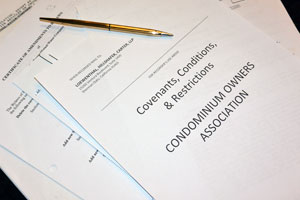LHC Newsletter Vol. 4, No. 3
“NAVIGATING THROUGH LITIGATION*”
By David A. Loewenthal, Esq.
*This newsletter contains highlighted excerpts from the January 2010 CACM Law Seminar Presentation that I co-authored with Larry Russell, Esq. of Russell and Mallett LLP. A link is provided below to a PDF file of the entire presentation text: (Navigating Through Litigation)
One of the most important and often times misunderstood areas of responsibility of an association’s general counsel is their role in litigation when defense counsel has been appointed by the Association’s insurance carrier. The following overview will attempt to touch upon various areas of general counsel involvement and explain the complexities of civil litigation, the discovery process, general representation during litigation and settlement.
1. The Role of General Legal Counsel During Litigation:
At the outset of litigation, several items need to be viewed and considered in determining general counsel’s role in litigation when insurance defense counsel has been appointed. First and foremost is whether or not the insurance company has issued a Reservation of Rights with respect to the lawsuit. Generally, a Reservation of Rights is a position taken by the insurance company based upon an analysis of the allegations set forth within the complaint and overview of the coverages afforded under the insurance policy. Reservation of Rights letters can run the gamut from being relatively minimal in the reservation, i.e., the vast majority of the claims are covered to quite extensive wherein there may be only a thread of a claim in the complaint that requires the insurance company to afford a defense.
Depending upon the extent of the Reservation of Rights letter issued by the insurance company, the Association may have a right to demand Cumis counsel be appointed to defend the Association. Cumis arises when the Reservation of Rights letter creates a conflict between the insurance company and the insured defendant which can lead to a concern regarding the defense afforded by the insurance company through the insurance defense counsel which could be guided in such a way so as to avoid or destroy coverage. In such circumstances the insured, (homeowners association), may be in a position to demand that Cumis counsel be appointed, i.e., counsel of the Association’s choosing to be paid for by the insurance company.
Based upon the complexities of the case and the position taken by the insurance company, general counsel’s role in the litigation may be either active, passive or non-participatory.
A. Active Participation:
Active participation of general counsel often arises when there is either a significant Reservation of Rights, but which may not arise to a Cumis counsel level, and/or when there is a concern that the defense attorney assigned may not have the appropriate experience and knowledge to provide a thorough defense on behalf of the Association. If the general counsel’s role is to be active, this would generally include reviewing all of the communications by and between defense counsel and the insurance company; meeting and conferring with defense counsel regarding a defense and discovery plan; providing ideas on how to litigate the case; and actively participating in any settlement discussions and involvement in the settlement agreement and release arising therefrom.
B. Passive Participation:
In the event that the Reservation of Rights letter issued by the carrier is relatively minimal in nature and, if the defense counsel assigned appears to be knowledgeable and experienced in the defense of associations, then the Association may make the decision to have general counsel’s role be more passive/limited in its participation. Under such instances, we would still recommend that general counsel be provided with copies of all communications by and between defense counsel and the insurance carrier and, in a more limited way, participate in strategy discussions, settlement talks and any settlement agreement arising therefrom.
C. Non-Participation:
In the event that there is no Reservation of Rights and the counsel that has been assigned is relatively knowledgeable in the practice area, general counsel’s role would likely be extremely minimal and again may be limited to simply reviewing correspondence by and between defense counsel and insurance company. Since the Association’s insurance policy will not have a consent clause, the insurance company is entitled to settle cases on behalf of the Association at their discretion.
2. Litigation Process:
The litigation process is often times long and laborious. During the litigation process, discovery is conducted by both sides, i.e., both the Association, as well as the plaintiff, in an attempt to determine information from the other side to either prosecute or defend the claim. Discovery can take many forms including Interrogatories, Requests for Admissions, Requests for Production of Documents, site inspections and depositions.
Typically, insurance defense counsel should prepare draft responses to the discovery and provide them to both the client, i.e., the Board of Directors of the Association, and to general counsel for review. It is essential that Board members not sign verifications under penalty of perjury without first reviewing the discovery, the responses and confirming the accuracy of same. Do not execute verifications without approving the discovery responses.
In addition to written discovery, depositions will also be conducted during the litigation. Generally, you can anticipate depositions of the Board of Directors, the manager and, in some instances, vendors who may have worked with the Association.
It is very important that the Board and manager be prepared for their depositions. It is our recommendation that Board members and managers that are to be deposed meet with defense counsel and, if necessary, general counsel, approximately two weeks prior to the deposition (if possible) to prepare for their deposition. This is better than merely meeting an hour before the commencement of the deposition at the office in which the deposition is to take place.
Often times the manager and/or the CEO of the management company may also be deposed. It is our general opinion that insurance defense counsel have an obligation to defend both the manager and the CEO during the deposition, even if they are not parties to the litigation, due to the fact that they are an agent for the Association; there is likely an indemnity agreement between the management company and the Association in the management contract; and, because the principle of Respondeat Superior will likely apply between the manager and the Association.
3. Legal Representation:
One of the first steps that general counsel must take once a lawsuit has been filed is to determine whether or not the lawsuit is against the Association or the Association and the management company. Assuming that both the Association and management company have been named in the lawsuit, a review of the management contract by general counsel is appropriate to confirm if an indemnity agreement exists between the Association and management company. Assuming that an indemnity agreement exists and that the claims that are being brought by a third party fall within the scope of work of the management company, general counsel should immediately demand that the insurance company assign defense counsel to represent both the Association and the management company. On those rare instances where there may be a potential conflict or finger pointing between the Association and management, it may be necessary to have separate counsel be assigned. Moreover, except in the rare circumstances where there is an allegation of egregious conduct by either the Association or management, it is typically beneficial to have the Association and management represented by one counsel, with the defense coordinated and avoid finger pointing, i.e., “circle the wagons”. This may require a written waiver of conflict between the Association and management company.
4. Other Litigation Events:
A. Mediation:
At some point during the litigation, the Court or the parties will likely suggest or be ordered to mediation. It is important that the Board be prepared for the mediation with a clear understanding of the issues and the alleged damages. It is important that general counsel attend the mediation if there is either a strong Reservation of Rights, non-covered claims, a belief that the insurance company will be looking to the Association to monetarily participate in the settlement, the Association will have to perform future acts, or if the Association has its own affirmative claims that are being asserted.
B. Settlement:
If the parties are able to reach a settlement, it is imperative that general counsel be intimately involved in the drafting and approval of a settlement agreement and release. Defense counsel is generally most interested in settling the case and getting the insurance company off of the clock with respect to both time and expense. However, due to the nuances that are involved with respect to homeowner associations, including the very important distinction between the Association as a corporate entity versus the individual members, as well as disclosure requirements that the Association has, it is imperative that the settlement agreement be drafted to protect everyone’s interest. Further, in the event that the matter is proceeding towards trial and the carrier is taking a hard line towards settlement, even if a settlement demand exists within the Association’s policy limits, often times the Association is well served by having general counsel issue a demand letter to the carrier demanding that they settle the matter within the policy limits. If the carrier fails to do so and the matter proceeds to trial and an adverse judgment arises which exceeds the policy limits, the Association can use this prior demand as a basis for going back to the carrier to pay the full amount of the judgment, even if it exceeds policy limits.
Though there is an upfront financial cost in having general counsel participate in litigation, such expense will likely ultimately provide substantial benefit and protection for the Association.
©2010 by Loewenthal, Hillshafer & Carter, LLP. All rights reserved. Permission is granted to reproduce or transmit in any form any part of this newsletter as long as proper attribution to Loewenthal, Hillshafer & Carter, LLP is given. Due to the rapidly changing nature of the law, information contained in this publication may become outdated. As a result, lawyers and all others using this material must research original sources of authority.
*Reprinted with permission from California Association of Community Managers, Inc. (CACM) Law Seminar (Copyright, 2010, CACM)


